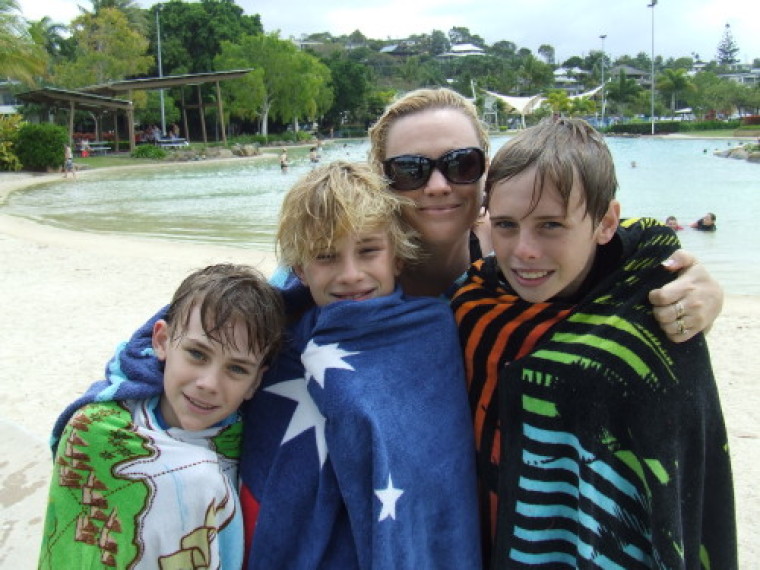
The article was written by Sarah McDonald who looked a UK study from a British television program that persuaded nine parents to take their kids to the local gated playground in a park in London.
All pretended to take an urgent phone call on their mobile and wandered off to then watch what happened when a man approached their child and asked them to help him look for his dog.
To the mothers' horror, seven of the nine children walked from the playground with him within 90 seconds. All had been warned about stranger danger.
Sarah McDonald wrote that watching the video twists the gut; even an eleven year old initially goes with the man (but then changes her mind and runs back to her mother). These stories make good TV says Sarah McDonald, because they connect us back to both the silent screams of childhood nightmares and to the greatest nightmare we have as parents.
Cited in the article are recent cases where children have been abducted and the question is asked of our community, whether we want to live in a land divided by fear and paranoia for our children.
Sarah McDonald goes on to ask about ourselves as parents. She says that she has an inherent faith in people and the good sense of her children, in that if she herself in (in her terms) crippled with fear she know that will surely be passed onto them – a contagion that could make them insecure, frightened and distrustful of others.
Moreover she is spot on when she says that having a child is in itself an ultimate act of hope and trust. In some sense, she says that she must keep faith in her society and her community or it leaves her lost and bereft of any hope, trust and of good-will.
Then we learnt recently that in Britain a grand-father collected what he thought was his 6 year old grand child from school and went for the doctor's appointment without noticing this anomaly. Moreover the mother of the six year old could not believe it, walking away with a strange man after all the warnings a family gives.
It is so easy
Delma my wife of 36 years often tells the story of a visit to the Campbelltown shopping mall on a Saturday when we were living in Wallacia. With all children in tow (4th was not yet born) sat them down to watch a children's pantomime in the mall and told them not to move. Delma went into the boutique adjacent to the performance.
Within two minutes all three were gone. The pantomime finished a minute later, 60 seconds might be a very short time for an adult, but for three little children it is an eternity when mum disappears. The good news was that all three were found by a Mall attendant and an announcement was made. Delma and the children were reunited.
Sarah McDonald's article and innumerable others cite case after case of similar "seconds only" incidents where mother and child are separated and it becomes permanent, or there are predatory situations such as a childless woman snatching a little one, or equally horrid men and women luring them away as in the illustration at the park above.
Solutions
There are any number of web sites and magazines and newspapers that provide the same basic advice that our grand-mothers offered to their children and in turn their children and so on. Stay close, don't run away, never let them out of your sight, put a child harness leash on them and the like.
In 1992 our entire family visited the US as I was engaged in speaking along with an international sports mission congress. The trip involved landing in New York via Japan, then to Washington DC,. Cleveland, Atlanta, Los Angeles, then home. Our youngest was just on 2 and so invested in a full harness leash for her and that worked well. Wherever we were the entire family stayed close together. We held hands whenever we walked the boardwalks of America's big cities as we did in Disneyland (LA). Discipline was the name of the game.
That's all well and good when away, but at home, everyone "takes'-off" after school, weekends or school holidays – each doing their own thing with their neighbourhood mates. We did it when we were kids, we all felt safe. I recall a second incident when we lived in Wallacia where our 2nd without telling us, went and played at a friend's house and it took us two hours to track her down with neighbours engaged in the search.
Today, children might have mobile phones to keep in touch, after school care, grand-parents nearby, a neighbourhood system of friends, and the like.
Now, technological developments akin to the digital leg brace of those under the legal system who are not permitted to leave their homes or similar court conditions are in the air, to attached to each child. It might seem far fetched but it appears to be one mechanism as there are now beepers attached to car keys (how many times have each of us misplaced our car keys).
The Bible is replete with instruction on looking after your children from Deuteronomy right the way through to I & II Timothy. The focus is not on the child however, the focus is squarely on the parents and their responsibilities. Where both parents work local solutions are necessarily being found within each suburb.
It's not easy.
Dr Mark Tronson is a Baptist minister (retired) who served as the Australian cricket team chaplain for 17 years (2000 ret) and established Life After Cricket in 2001. He was recognised by the Olympic Ministry Medal in 2009 presented by Carl Lewis Olympian of the Century. He has written 24 books, and enjoys writing. He is married to Delma, with four adult children and grand-children.
Mark Tronson's archive of articles can be viewed at
www.pressserviceinternational.org/mark-tronson.html